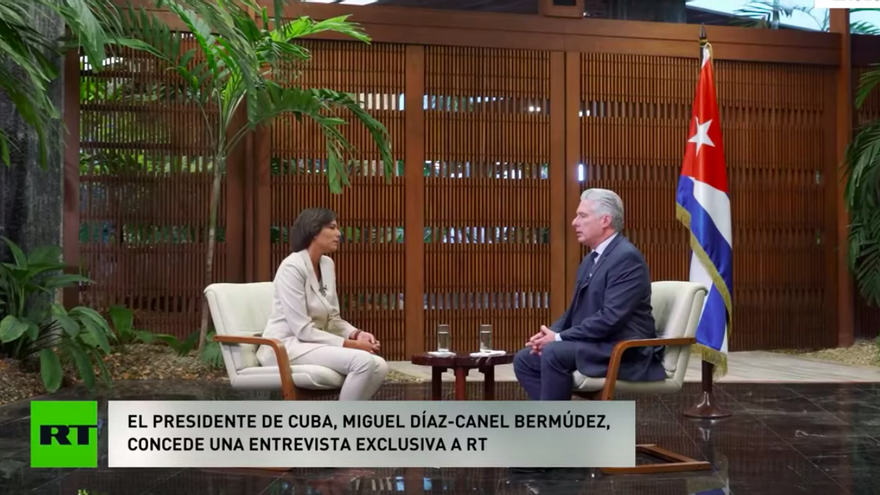
![]() 14ymedio, Havana, 30 May 2023 — In front of the Russian television cameras, Cuban President Miguel Díaz-Canel once again declared his unconditional friendship with Vladimir Putin. In a long interview, he defended the Social Communication Law recently approved by Parliament and called on the peoples of the world to “move away from the dollar.”
14ymedio, Havana, 30 May 2023 — In front of the Russian television cameras, Cuban President Miguel Díaz-Canel once again declared his unconditional friendship with Vladimir Putin. In a long interview, he defended the Social Communication Law recently approved by Parliament and called on the peoples of the world to “move away from the dollar.”
In the conversation, broadcast by the Russia Today television network and available from this Tuesday to Cubans, the president explained to Cuban journalist Aliana Nieves “the place occupied by the nation in the current geopolitical context.”
Díaz-Canel didn’t mince words: “I consider President Putin as a friend. A sincere friend to Cuba. And he has also demonstrated it with actions,” he said. “There is an excellent relationship between the Russian Federation and Cuba,” despite the fact that at some point there may have been “incomprehension or some fracture” between the two countries.
However, all the rough edges were smoothed out, he said, in November 2022, when a Cuban government delegation went to Moscow in search of economic support. “I felt an enormous understanding from President Putin about Cuba’s problems and situation,” he said.
Díaz-Canel exalted Putin as a “Russian and world leader” with whom he claimed to “coincide on many points of the international agenda.”
He also referred to the “historic ties” between Havana and Moscow since Soviet times, including, he said, in the family sphere: “There are Cuban-Russian families, and an important part of the skilled workforce talent that we have in our country was educated in Russia, with a whole exchange.”
He emphasized what he described weeks ago as his support for Russia’s “energetic condemnation of the West,” although this time he limited himself to “strongly condemning” NATO for “expanding its borders” with Russia.
From Moscow, he summarized, the Island hopes for food, medicines, tourists and economic and commercial support. At the end of the statement, Nieves alluded to the “hope” that was causing the signing of so many bilateral agreements in economic matters, “that ought to or have been translated into everyday life.” Díaz-Canel agreed with the comment and added that the changes would occur “in the medium term.”
To the question about his detractors’ concerns about the Kremlin’s “advice” to the Cuban business sector, Díaz-Canel responded that you have to see “where those doubters come from.”
He claimed that the United States should be the real concern, because it “tightens the screws” more and more. “They give false expectations of an alleged effort to improve the Cuban situation, and everything we experience is the opposite,” he said, not clarifying if he was referring to the Cuban government’s discussions with Washington.
Asked about Cuba’s future role in the context of the economic alliance between Brazil, Russia, India, China and South Africa (BRICS), Díaz-Canel again attacked the United States and limited himself to saying that the Island hopes for a “multilateralism” where Russia also has a leading role.
“BRICS is considering separating from dollarization,” he said, and he pointed out his “strategy”: “By moving away from the dollar, the sanctions imposed by the United States are avoided. Cuba is an example of that,” he said, without alluding to the fact that international remittances in dollars and euros keep the precarious national economy afloat.
One of the measures to incorporate trade with Russia, he added, has been to open subsidiaries of Cuban banks in Russia and branches of Russian banks and financial agencies on the Island.
As for the Social Communication Law, Díaz-Canel called it “historic,” since none of his predecessors in the Government had dealt with the issue, and the legislation, in that sense, “was totally outdated.” “It cannot be a law that remains for many years,” he said, because of the “tremendous speed” at which communications technology advances.
In the context of the law’s approval and the justification for its severity, the president followed the usual script: “Cuba, like other countries, is totally assaulted in the media by campaigns of hatred, slander and discredit, which come from imperial centers of power supported by the US Government,” he said.
“Networks are less and less democratic and are managed by a small number of transnationals” with their own interests, he alleged. His solution? “Post our own content,” adding that he intends for the Cuban population to “know how to communicate” in that way.
Díaz-Canel said that he had achieved “consensus” with the citizenry and was implementing a “culture of debate”: “This is a paradigm that many in the world defend, but that is broken when they try to fracture the dialogues, when others say different things than those they want to impose,” he said, without alluding to the severity of the recently approved law that even penalizes interaction on social networks.
He dedicated the last part of the interview to China but did not describe the present state of its relations with the Island. He limited himself, again, to criticizing the United States and theorizing about the “Taiwan issue,” which threatens the “reunification” that Havana and its allies defend.
Translated by Regina Anavy
____________
COLLABORATE WITH OUR WORK: The 14ymedio team is committed to practicing serious journalism that reflects Cuba’s reality in all its depth. Thank you for joining us on this long journey. We invite you to continue supporting us by becoming a member of 14ymedio now. Together we can continue transforming journalism in Cuba.
